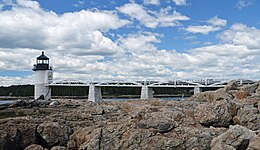
Port Clyde is the southernmost settlement on the St. George peninsula in central/coastal Maine and part of the town of St. George in Knox County, Maine, United States. The ZIP Code for Port Clyde is 04855. [1]

Port Clyde is the southernmost settlement on the St. George peninsula in central/coastal Maine and part of the town of St. George in Knox County, Maine, United States. The ZIP Code for Port Clyde is 04855. [1]
In the 19th century, Port Clyde became a busy port featuring granite quarries, tide mills for sawing timber, and shipbuilding and fish canning businesses. By the 20th century, the area attracted artists and writers. [2] The Country of the Pointed Firs was written by Sarah Orne Jewett in St. George. [2]
Port Clyde's harbor was originally known as Herring Gut. [2] Marshall Point—site of the Marshall Point Lighthouse—is Port Clyde's southernmost extremity. This lighthouse is the one to which Tom Hanks ran in the 1994 film Forrest Gump . [3]
Port Clyde was home to The Port Clyde Packing Co., manufacturer of Port Clyde Sardines. Employing around 200 people, it was the largest employer in the area for most of its existence. The factory was destroyed in a fire on September 26, 1970. [4]
An overnight fire on September 27–28, 2023, destroyed the settlement's general store, the Maine Wyeth Art Gallery, a restaurant, and offices of the local boat line. [5] [6]

St. George is a town in Knox County, Maine, United States. It includes the villages of Port Clyde and Tenants Harbor, with the latter being town's commercial center. A favorite with artists, writers and naturalists, St. George is home to the Brothers and Hay Ledge nature preserve, comprising four islands off Port Clyde. The town's population stands at 2,594 residents, according to the 2020 Census.

Monhegan is an island in the Gulf of Maine. A plantation, a minor civil division in the state of Maine falling between unincorporated area and a town, it is located approximately 12 nautical miles (22 km) off the mainland and is part of Lincoln County, Maine, United States. The population was 64 at the 2020 census. The plantation comprises its namesake island and the neighboring island of Manana. The island is accessible by scheduled boat service from Boothbay Harbor, New Harbor and Port Clyde. Visitors' cars are not allowed on the island. It was designated a United States National Natural Landmark for its coastal and island flora in 1966.

Andrew Newell Wyeth was an American visual artist, primarily a realist painter, working predominantly in a regionalist style. He believed he was also an abstractionist, portraying subjects in a new, meaningful way. The son of N. C. Wyeth and father of Jamie Wyeth, he was one of the best-known U.S. artists of the middle 20th century. James H. Duff explores the art and lives of the three men in An American Vision: Three Generations of Wyeth Art. Raised with an appreciation of nature, Wyeth took walks that fired his imagination. Henry David Thoreau, Robert Frost, and King Vidor's The Big Parade (1925) inspired him intellectually and artistically. Wyeth featured in a documentary The Metaphor in which he discussed Vidor's influence on the creation of his works of art, like Winter 1946 and Portrait of Ralph Kline. Wyeth was also inspired by Winslow Homer and Renaissance artists.
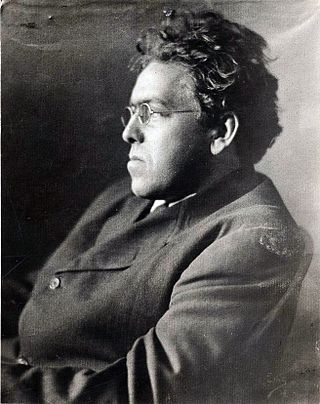
Newell Convers Wyeth, known as N. C. Wyeth, was an American painter and illustrator. He was a student of Howard Pyle and became one of America's most well-known illustrators. Wyeth created more than 3,000 paintings and illustrated 112 books — 25 of them for Scribner's, the Scribner Classics, which is the body of work for which he is best known. The first of these, Treasure Island, was one of his masterpieces and the proceeds paid for his studio. Wyeth was a realist painter at a time when the camera and photography began to compete with his craft. Sometimes seen as melodramatic, his illustrations were designed to be understood quickly. Wyeth, who was both a painter and an illustrator, understood the difference, and said in 1908, "Painting and illustration cannot be mixed—one cannot merge from one into the other."

Casco Bay is an inlet of the Gulf of Maine on the coast of Maine in the United States. The National Oceanic and Atmospheric Administration's chart for Casco Bay marks the dividing line between the bay and the Gulf of Maine as running from Bald Head on Cape Small in Phippsburg west-southwest to Dyer Point in Cape Elizabeth. The city of Portland and the Port of Portland are on Casco Bay's western edge.
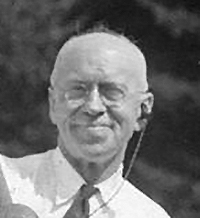
Russell Williams Porter was an American artist, engineer, amateur astronomer and Arctic explorer. He was a pioneer in the field of “cutaway illustration" and is sometimes referred to as the "founder" of amateur telescope making."
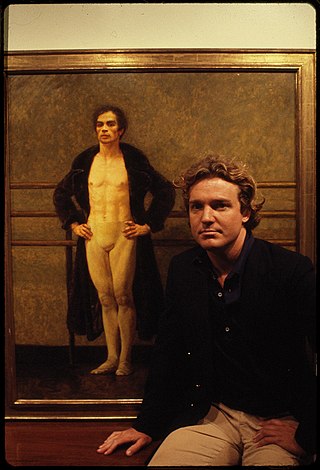
James Browning Wyeth is an American realist painter, son of Andrew Wyeth, and grandson of N.C. Wyeth. He was raised in Chadds Ford Township, Pennsylvania, and is artistic heir to the Brandywine School tradition — painters who worked in the rural Brandywine River area of Delaware and Pennsylvania, portraying its people, animals, and landscape.
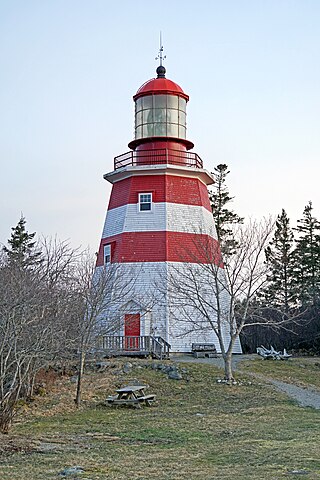
Barrington, officially named the Municipality of the District of Barrington, is a district municipality in western Shelburne County, Nova Scotia, Canada. Statistics Canada classifies the district municipality as a municipal district.
St. Joseph was a boomtown founded in 1835 on the shores of St. Joseph Bay that briefly became the largest community in Florida before being abandoned after less than eight years. A yellow fever epidemic in 1841 ended its brief period of prosperity and the abandoned remnants of the town were destroyed by a storm surge in 1844. The town site is in Gulf County, Florida, near the city of Port St. Joe.
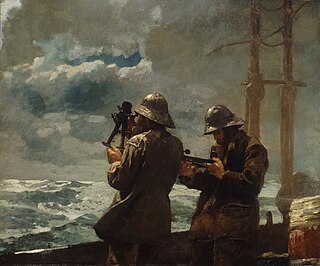
Eight Bells is an 1886 oil painting by the American artist Winslow Homer. It depicts two sailors determining their ship's latitude. It is one of Homer's best-known paintings and the last of his major paintings of the 1880s that dramatically chronicle man's relationship to the ocean.

Marshall Point Light Station is a lighthouse at the entrance of Port Clyde Harbor in Port Clyde, Maine. The light station was established in 1832.

Tenants Harbor Light, also known as Southern Island Light, is a lighthouse at the mouth of Tenants Harbor, St. George, Maine, United States. It appears in paintings by Andrew Wyeth and his son Jamie Wyeth, who have owned the lighthouse since 1978.
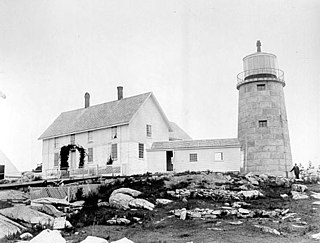
Whitehead Light is a lighthouse on Whitehead Island, on Muscle Ridge Channel, in the southwestern entrance to Penobscot Bay, Maine. It is in the town of St.George. Established in 1804, it is one of Maine's oldest light stations, with its present tower built in 1852 to a design attributed to Alexander Parris. It was listed on the National Register of Historic Places as Whitehead Light Station on March 14, 1988. The property is now owned by not for profit Pine Island Camp. Whitehead light station offers to the public various stays at the light station from getaway weekends to learning retreats and renting the station as a vacation home. The light itself remains an active aid to navigation, maintained by the United States Coast Guard.
Allen Island or Allen's Island is a 450-acre (180 ha) private island which is part of St. George, Knox County, Maine, United States. it is located near the southeastern end of Muscongus Bay, roughly midway between the southernmost parts of the St. George's mainland, and Monhegan Island.
Linda Lorraine Bean was an American businessperson and donor. As a candidate of the Republican Party, Bean ran unsuccessfully for the United States Congress in 1988 and 1992. She was the granddaughter of Leon Leonwood Bean and an heiress to the L.L.Bean company.

Thomaston, formerly known as Fort St. Georges, Fort Wharf, and Lincoln, is a town in Knox County, Maine, United States. The population was 2,739 at the 2020 census. Noted for its antique architecture, Thomaston is an old port popular with tourists. The town was named after Major General John Thomas.

The Land's End Historic District encompasses a well-preserved enclave of summer residences built in the early 20th century in the Port Clyde area of St. George, Maine. Developed between 1907 and 1919 by Russell W. Porter, it includes an architecturally eclectic mix of modestly scaled cottages. The district was listed on the National Register of Historic Places in 2011.

Betsy James Wyeth was an author and art collector, who was also the business manager and archivist of her husband, artist Andrew Wyeth.